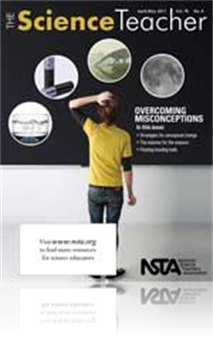All The Science Teacher resources
Journal Article
When science teachers pass up the use of an inductive approach in their teaching, they miss a golden opportunity to improve their chances of attaining one of their avowed and highly regarded objectives of science teaching—the development of ability...
Journal Article
There’s No Such Thing as a One-Celled Plant or Animal
Early biologists classified living organisms based on what they knew about life: All living things were either animals or plants. The fossil record as late as the 18th and 19th centuries seemed consistent with this two-part scheme. In recent years, m...
Journal Article
The idea for the Scope, Sequence, and Coordination (SS&C) reform effort was conceived in the early 1980s, primarily in response to practices in U.S. secondary schools that filter out the majority of students from higher level science courses. The cur...
Journal Article
The Constructivist Learning Model
Much cognitive science research has been used to support a new model of learning. This most promising new model is called the Constructivist Learning Model (CLM). Russell Yeany (University of Georgia) has called CLM the most exciting idea of the past...
Journal Article
In 1669, a German alchemist named Hennig Brandt identified the element we now call phosphorus. He was the first in his craft to be immortalized because his work marks the beginning of the period when chemical investigators kept detailed records. Fift...
Journal Article
The U.S. science education community has been alternately encouraged and disheartened by the results of the Third International Mathematics and Science Study (TIMSS). While our fourth graders outperformed students from most countries, our eighth grad...
Journal Article
It is very important to show how open-mindedness and tolerance, or their lack, function in social situations. Ask the pupils to cite personal experiences, or the statements and actions of prominent people, to illustrate the part played in everyday li...
Journal Article
In general, the way that introductory courses in science are taught leads students to a limited view of science: science as totally objective—as the truth, constructed out of numbers, wires, and laboratory animals by faceless and dimensionless rese...
Journal Article
The New Curriculum Movement in Science
The new science courses differ in purpose from traditional courses and so do the tests. A student is first of all required to understand the facts, formulas, and principles he has learned. Therefore, knowing about science and having the ability to me...
Journal Article
The Social Responsibilities of Scientists and Science
The following article is based on Dr. Pauling’s address at the annual Convention of the National Science Teachers Association in New York City, April 3. This article was first published in May, 1966....
Journal Article
Idea Bank: Celebrating Seren<i>dipity:</i> Connecting Chemistry and History
In today's world of social media websites and Web 2.0, people are connected like never before. Why not use these web tools in the science classroom? In this month's Idea Bank, the authors propose that teachers use an online timeline called Dipity to ...



